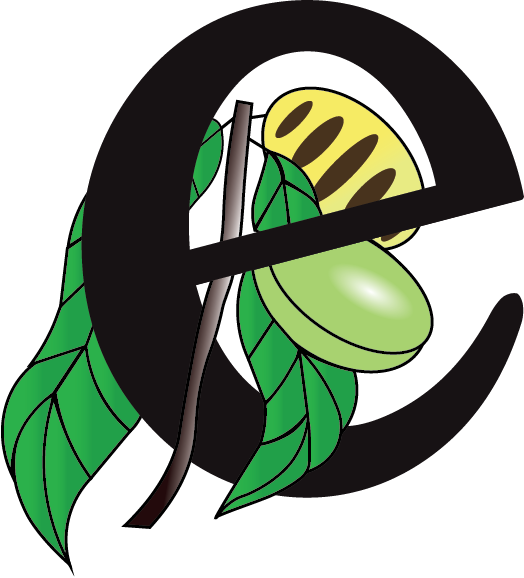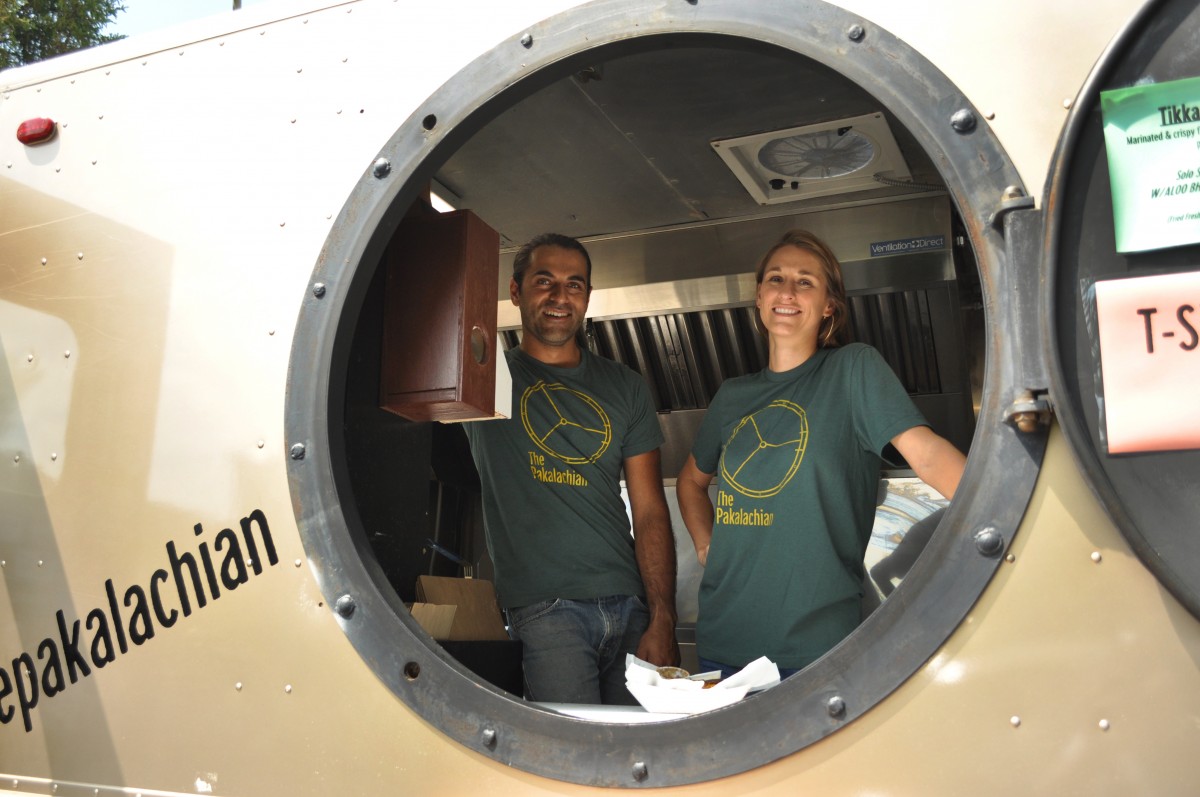
Whether Katlin and Mohsin Kazmi are in their garden harvesting onions and garlic, or in the kitchen chopping and sautéing those same ingredients, they spend a lot of their time together thinking about the concept of home.
Katlin grew up in a farming family in Russell County, Virginia, close to where the couple now resides, in Abingdon. Mohsin, grew up in suburban New Jersey, the son of Pakistani immigrants.
The Kazmis best-known interpretation of the idea of home is served on plates and in snack baskets, from the tiny kitchen of their ornately decorated food truck. Stocked with aromatic spices, and filled with farm-fresh vegetables, their restaurant-on-wheels– The Pakalachian– incorporates gastronomic cues from Katlin’s southwest Virginia home and the Punjab region of Pakistan where Mohsin’s family has roots.
The cuisine served from the truck is exactly what it sounds like: a mashup of Pakistani and Appalachian gustatory traditions. Take The Pakalachian’s green tomato pakoras, for example. As Mohsin coats slices of crisp, unripe tomatoes in a spiced chickpea flour batter just before deep-frying, he describes the dish as both a classic Pakistani fritter and a play on classic fried green tomatoes found in Appalachia and across the American south.
“We didn’t have fried green tomatoes growing up,” he says, “but pakoras, my mom would make them on days when she’d just open the fridge and say, ‘What do I have left?’”
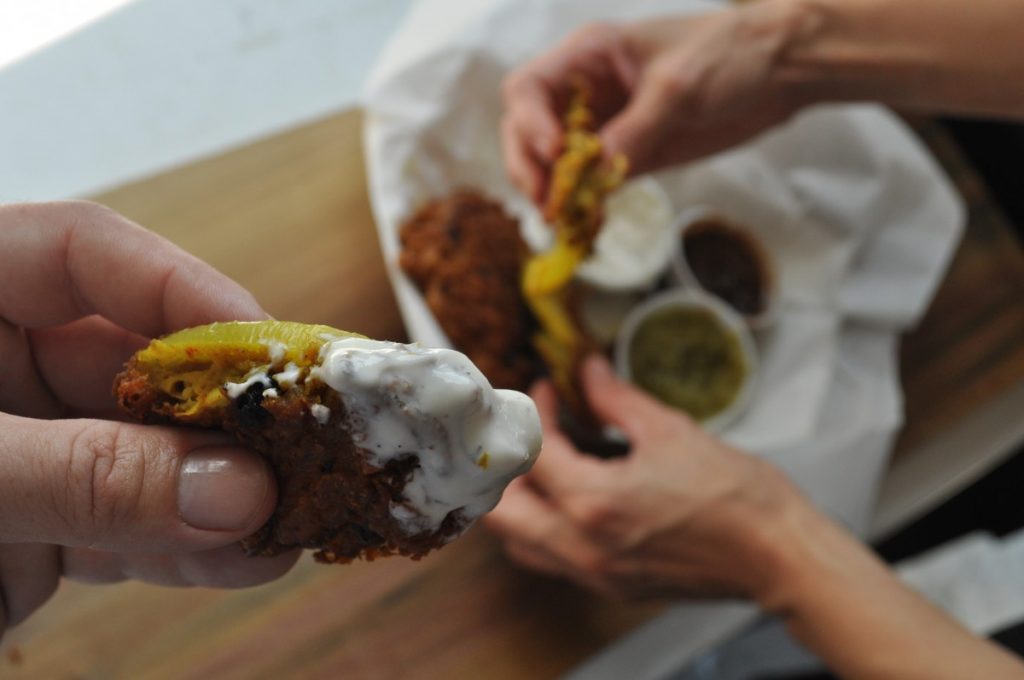
That thrifty use-what-you-have mentality was familiar to Katlin as well. It’s just one shared experience that allowed The Pakalachian to be conceptualized over two years ago. While returning from a Thanksgiving dinner at which both families were present. Those early holiday gatherings brought out stark cultural differences.
“When our families first met each other, they would come to us separately and say, ‘what did they say?’” Katlin recalls. “My grandpa would come to me and ask, ‘what did Mohsin’s dad say? Then Mohsin’s dad would say, “what did your grandpa say?”
But such occasions also brought out striking commonalities, so when Katlin and Mohsin floated the idea of starting a food truck that represented the cuisines of both cultures, The Pakalachian became a labor of love for both families.
The truck travels to “pop-up” locations, on college campuses, at music festivals, or at local breweries. Parents on both sides of the family have contributed elbow grease to make The Pakalachian the locally-popular, smooth-running operation it is today.
On a late-November afternoon, The Pakalachian is set up for a special pop-up event at Emory and Henry College in Abingdon. Katlin’s father Frank dashes out the truck’s back door to deliver a to-go order he brokered over the phone. Her grandfather, Joe “Da” Thomlinson, acted as back-of-house kitchen staff, putting away ingredients as service wrapped up.
Further away, in Charlotte, North Carolina, Mohsin’s father, Syed, a chemist, ponders how to make biodiesel from the truck’s spent fryer oil. Mohsin’s mother, Toqeer, has also helped during competitive food truck cook-offs, including The Pakalachian’s national television debut, on the Food Network’s “Family Food Showdown.”
“If you were to calculate the compiled amount of hours that you would need to get to know a family that you’ve just met or married into, to get to the level of familiarity that I’m at right now? That would take decades,” Mohsin said.
The Pakalachian’s gastronomic influences seem discordant on the surface, Katlin explains, but ultimately, she says, they make sense.
“Every single dish on our truck is a fifty-fifty combination of Pakistani and southwestern Virginia ingredients and traditions,” she said. “All your root vegetables, your potatoes, your carrots, everything in terms of how we fix it may be different, but the items themselves are the same.”
While the Kazmis sharply define their menu items based on specific ingredients from Pakistan and southwest Virginia, they lend them their own lighthearted spin.
Mohsin cites dishes like Tikka My Senses, a play on words describing a menu staple that combines traditional Pakistani barbecue and southern fried chicken. Flavored with a kitchen sink of Punjabi spices, Tikka My Senses is a sublime sandwich topped with tangy dill pickles to balance the warmth and intensity of the chicken filet’s crispy, spicy coating.
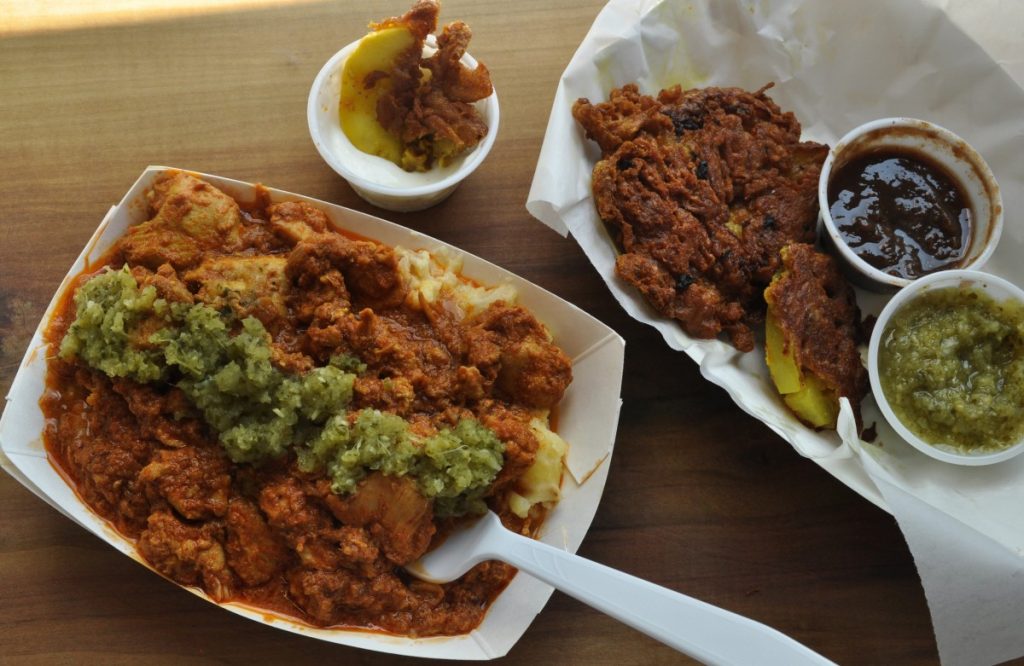
The truck also functions as a mobile education space to nourish minds as well as bodies. It introduces South Asian traditions to a wholly different audience in the Abingdon area, and serves as a source of pride for southwest Virginia traditions.
As a college student at Virginia Tech, a mere 100 miles north of Abingdon, Katlin said she felt like the cultural traditions of her agriculture-based community were often perceived as “other than.” Mohsin’s friends from New Jersey harbored some of those stereotypical views, as well. They still question his decision to move to rural Virginia, he says, but Mohsin doesn’t see the differences between the disparate regions so clearly as the similarities.
“You’ve got these people that work really hard, they work with their hands,” Mohsin says of the Punjabi people in his family’s ancestral home. “Then I talk to Kaitlin and she’s got the same stories about family that I have, just with small details changed.”
“We plant a garden every year,” Katlin said of her family’s agrarian roots. “It’s the same way that Punjabi culture is an agricultural-based society.”
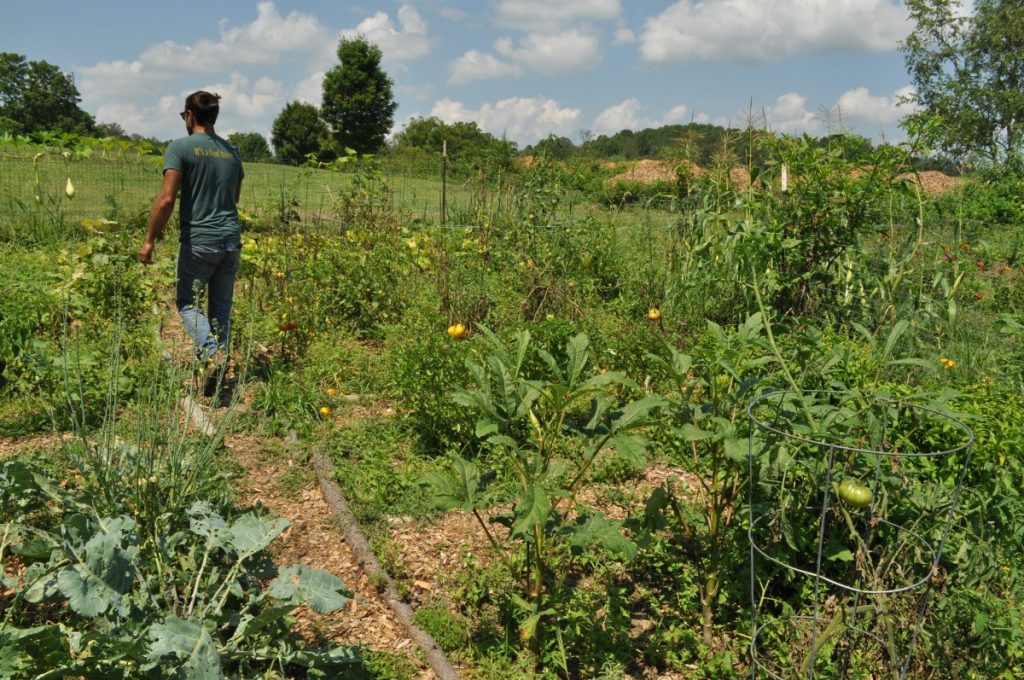
While the cultural similarities bound the Kazmis together, they still questioned if their venture would ultimately be accepted by their rural community. They weren’t alone. Others were skeptical that a food truck offering such neo-traditional fare would be successful.
“In the beginning, everybody was like, ‘I don’t know [if this will work] and they were really nervous. But they have really understood and have bought into the idea that it is a fusion of cultures that is so similar it’s disturbing sometimes,” Mohsin laughs.
“When we started the food truck we sat down and did a Venn diagram,” Mohsin says. Virginia’s lust for bacon and ham wouldn’t show up on the Pakistani side. Likewise, there weren’t many uses for chickpeas and tamarind in the Appalachian circle. But it was the shared significance of traditional ingredients in the overlapping section– okra, cornbread, tomatoes, stewed beans– that stood out. “The more we thought about it, the middle part kept growing and growing.”
The couple strive to represent place-based identities of disparate regions and cultures through their careful orchestration of traditional recipes, fresh local vegetables and heady South Asian spices. In doing so, they’re challenging perceptions of their families’ traditional cuisines, changing attitudes about both Pakistani and Appalachian foods. By operating in rural southwest Virginia, the Kazmis are also disrupting a commonly-held notion of Appalachia as a place resistant to change.
“When you’re faced with putting the Pakistani element in a place that has certain stereotypes, of course, it crosses your mind that you’re taking a risk on multiple levels, but we’ve found quite the opposite,” Katlin said. “Our community has been receptive. People have wanted it.”
Randi Goodman is one of those people. A stalwart fan of The Pakalchian, Goodman seeks out the food truck at breweries and festivals like Rhythm and Roots, where she enjoyed consecutive helpings of a dish cleverly named Curry Me Down South.
“It combines something unusual to our area to something that is familiar,” Goodman said of the tomato-based chicken curry, served over mashed potatoes prepared from a family recipe Katlin’s grandma handed down years ago. “You get this wonderfully spicy and tangy curry chicken with the creamy and savory potatoes. It works so beautifully together.”
For regular customers like Goodman, who works at an independently-owned bicycle shop in Bristol, the Pakalachian is more than a literal vehicle to flavor, especially as more and more corporate franchises show up along the I-81 corridor, competing with existing small businesses.
“That’s definitely an equally important reason as to why I love the Pakalachian,” she said of the opportunity to keep locally-spent dollars in local pockets.
The truck itself is now just as much a hybrid as the Kazmis’ cuisine. In July of 2019, they hired a renowned Pakistani truck muralist Haider Ali to give The Pakalachian a most distinguishing aesthetic.
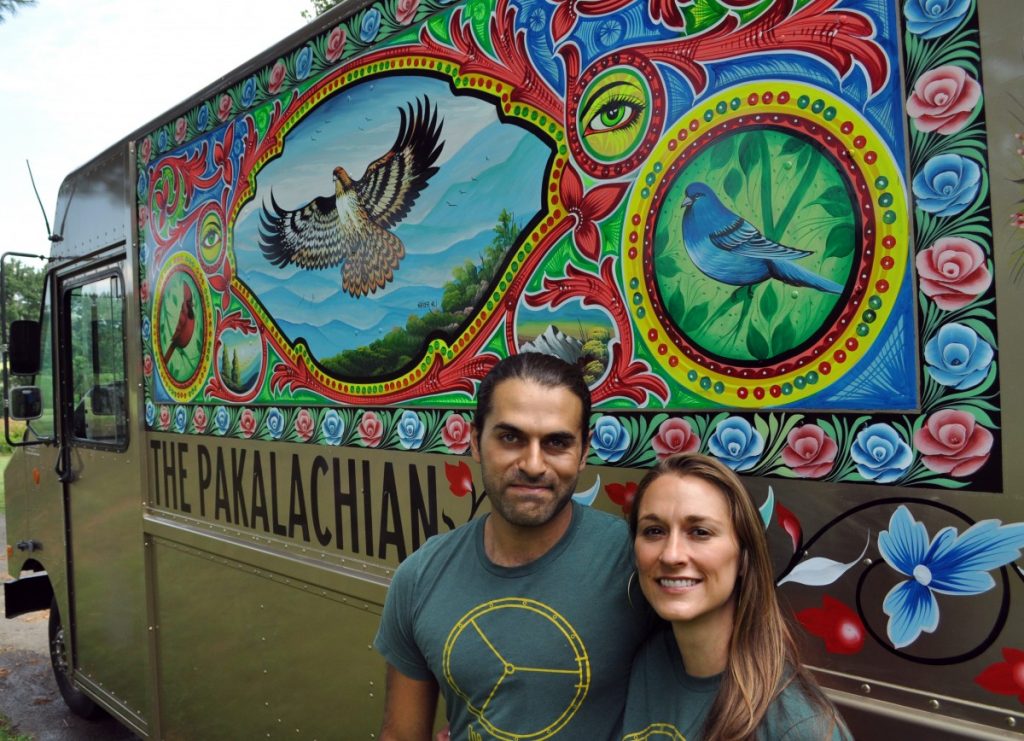
Ali’s mural depicts undulating waves of the mountains of Appalachia centered with a hawk flying high above the landscape and a cardinal and a bluejay on either side. In Pakistani tradition, bright magenta and sea-blue colors accent the border designs. The characters are in the Urdu language. According to Ali, traditionally truck owners who take the trouble to paint their trucks are blessed with better business.
“It has made such a difference in the way people perceive things. People come for the food but they end up taking pictures in front of the mural,” Mohsin said. “It’s legit Pakistani folk art.”
As cooks and educators, the Kazmis see their role as creating a forum, at music festivals, local breweries, to create conversation and achieve a level of understanding resembling the unexpected convergence they discovered in their own backgrounds.
“These countries are literally thousands of miles apart,” Katlin said. “And we’re bringing them together through food.”
This article was originally published by 100 Days in Appalachia, a digital news publication incubated at the Reed College of Media at West Virginia University.
Amy Loeffler (@gastropublica) has been writing about food and agriculture in Virginia since 2009 when she worked as an intern and reporter for Northern Virginia Magazine’s food desk.
